Ana Jovanović, Serbia (she/her)
18 September 2025
Can you tell me what it is like to be a Romani woman in Serbia?
In Serbia, there are deep-rooted prejudices against the Roma, and it follows those of us who are "coloured" by it all our lives. When I was younger, I was surprised that it even mattered that I had a different skin colour than my friends. It followed me throughout my youth, but I felt it the most in elementary school, since I was the only Roma girl in the class and that was something very unusual. Children ran away from me and explicitly told me that it was because I was Roma, black, dark.
When you were younger, did you ever feel anger toward yourself because your skin was darker while everyone around you was lighter?
I grew up in the Slana bara neighbourhood in Novi Sad. In that part of the city, the houses are decent, the streets are paved, and the community is mixed, I had a nice childhood but always coloured by racism. In elementary school, this was really felt in the sense that children ran away from me. My entire childhood was marked by discrimination, and that was on a more basic level, not only because I was a dark-skinned child, but also because I was different from other children. I have always been characterised as a girl, as a child who is very sensitive, who prefers to play with girls and prefers feminine things to things that are typical for boys. That is when everything started.
When you were younger, did you feel different from others — not only in terms of sexual orientation, but in general? Not like “I don’t belong here,” but rather “why am I not like the others?”
I did not notice the difference in myself until others hinted to me that I was different. I just lived my trip, I had my own world, which was completely natural to me, but other people always told me that it was wrong. For example, I liked to play with dolls and it was natural for me, but my mom told me not to play with dolls because it's not for boys. At school it was natural for me to join the girls and skip rope with them, but then the boys laughed at me and teased me, shouting: "Girl, girl!", I was not aware of why it was happening. When I showed up at school, the children ran away from me, they didn't want to share a eat with me or hang out, sit next to me, because I'm a "gypsy". It was not clear to me why this was happening because, when I was little, I only existed in time and space, and other people were the ones who told me that this and that was wrong, that I was this or that. I had always been an honest and spontaneous child, but I always received a signal from others that I had to stop, that I couldn't, that I shouldn't do something that was natural to me.
Does that mean you were self-aware, while others were not in touch with themselves?
Already at the beginning of high school, at the age of fourteen or fifteen, I realised that I liked boys more. Before that, I wasn't really defined, as a child I was taught that boys should fall in love with girls and that they should have an affinity for girls, as should I.
At what moment did you realise you were part of the LGBTQ community?
I had crushes, but I was never clear about what that meant, I didn't associate it with anything, except when others taught me that I had to have a crush, on a girl. My crush was so-and-so because she had beautiful hair. However, when puberty came, I started liking boys and only boys. That was the first time I felt that something was wrong. I realised that I am something else. We are talking about the period where I was born as a boy and I lived as a boy and I, as a boy, an attraction to boys developed and that was a problem, because everyone else around me felt an attraction to the opposite sex and fell in love with the opposite sex, while I fell in love with the same sex! All the while, I was getting messages about how being gay was terrible, tantamount to murder.
How did you deal with that inner conflict — on one side hearing messages that this is bad, but on the other side, from the start, since you were a kid, you were honest with yourself? What was happening inside you at that time?
I felt like an alien, I suppressed what was happening inside me and tried to adapt to the world, because if I didn't, I would be rejected, I would be removed, and we know it ourselves, we are programmed to be part of society and as humans we need to socialise. I knew what was happening to me, but I suppressed it and pretended that nothing was happening, even though there were fractures within me. I let myself go until my body started reacting in terms of depression, suicidal thoughts, anxiety that I didn't associate with my sexuality, while all the while that was precisely the cause. Suppressing my true nature led to me developing an anxiety disorder and eventually depression and suicidal ideation.
During the period when you were male and attracted to men, did you come out? Did you have the support of your family?
During the period when I was a boy, and I liked other boys, I didn't blame my family directly, but I did blame my mother indirectly. She always knew, as mothers always know. My mother knew something was going on, she didn't believe it was transgender, but she thought I was just gay, because that's what I thought at one time as well.
I “came out” by accident. I was in a car accident, I had just passed by driving test, the car broke down and my stepfather came to tow me, I forgot to put the key in the ignition and my steering wheel locked, so he dragged me without being aware that my steering wheel was locked and on that occasion he rammed me into three parked cars and a tree. Due to the stress, I lost my voice and could not speak, my parents were beside themselves that I had lost my voice and experienced such stress. My mother sat down to talk to me because she had noticed that I had been very depressed, even before the accident, and that something was happening with me. She then told me that she understood me that she saw that something had been happening with me and that she suspected that I was gay, and I just nodded my head and said that I was. She gave me all her support then, telling me that she was my mother and that I could tell her anything, that she will never leave me and truly, we have always had an open relationship.
And your extended family – did they accept you?
From the extended family, no one talked to me about it, but they all somehow knew. My mother had more communication with them, so she recounted to me those same old things like – "Oh, he's already getting on, and he hasn't married yet!" I have no contact with my extended family now, they all already know that I am trans, and a rift has come between us.
How did the Romani community accept you before you came out?
I was primarily a Roma student, and as a Roma student, I wanted to give back to the Roma community what provided for me through activism, because thanks to affirmative measures for Roma, I managed to enrol into university. I was accepted, but there were always comments that I, then a boy, was too feminized, effeminate, strange, and gay. Even the children in the Roma settlements noticed and told me that I was gay, I also had unpleasant situations in the Roma settlements because they suspected that I was gay. That, however, was always in the background, the project that I was working on was always put in the foreground, and I was able to engage in activism other than LGBT activism.
How did you cope with that, or rather, how were you coping with it? You are involved in activism and helping Roma, yet you were experiencing discrimination. What was going through your mind?
It still meant that I had to hide who I was and that I would have to do the things I loved in secret. It was a very ugly feeling, because I had come to help them, to work with them on something that would help them personally, and they discriminated and rejected me because I was "something". They weren’t even sure that I was gay, but made the assumption, based on my physical appearance, behaviour and gestures, that I was a person of homosexual orientation. That was always frustrating for me, it was always scary because I had no other example around me, I had no role models, someone who was both gay and a Roma activist. I had to pretend, keep silent and suffer through the discrimination. Before I came out, my role models were Roma students, they were my great motivators. I got to know them because they came to my Roma settlement through the project.
Who was your role model?
I lived in two Roma settlements, in Slana bara, which I have already mentioned, which was more organised and better, but also in Veliki rit, which did not even have basic living conditions. When I lived in that latter Roma settlement, without electricity or water, the Roma students were the ones who came and said: "Hey, there is hope for you yet!" I was very motivated by Roma students because they also came from such settlements, and they managed to get to a higher education.
How did the LGBTQI community look at you as a Romani person?
As for the LGBT community, and this is very specific to Novi Sad, when I went to the first organisation, I encountered enormous support because the people who were there were already very aware of the problem faced by the Roma. I didn't have to try very hard at all, I was accepted like any other person who asked for support in that organization. I was accepted from the start, so I never felt discrimination from the LGBT community. My impression is that LGBT organizations in Serbia are educated about the issues faced by the Roma.
Now we’ve come to the period of your life when you realised you were not gay, but something else?
I knew I was a girl from the age of five. I have photos of me at the age of six or so wearing a dress. I know that I have always functioned as a girl, but as I grew up, met people, they told me what I was, and I appropriated everything. That's how I accepted that I was gay. It was natural for me to behave in a certain way and it caused reactions, it was natural for me to play with girls, so they told me that I shouldn't because I was a boy, when I let my hair grow, my mom always cut it short, when I felt attracted to boys, people told me that I was gay. And I accepted all that, unconsciously, I had no information that it could be otherwise, that I might be trans. All this time I've been living with the information that I'm male and that since I like boys, that means I'm gay. I had no information whatsoever that there were trans people. I found out that trans people exist only later, when sensational news appeared in the Serbian media about people who dress as women, who are prostitutes, and so on. I didn't even know that I was transgender. I thought I was a boy who liked other boys and that meant that I was gay. Until the Internet came along and I started doing a little more research.
That moment when you told yourself — Ana (or back then Radovan) — from now on we’re working on ourselves. What was that like?
I then met a trans woman, a sex worker who, unfortunately, had a tough life, used narcotics and was the object of ridicule among the team that gathered in an LGBT club in Novi Sad. I was very scared; it was my first encounter with a trans person. I just said: "No, I'm not this, if this is what it means to be trans, this is not who I am!" And then I buried it deep within myself. All the time I knew something was going on, I was pretending to be gay, and then I saw a trans woman and I told myself that I was not a trans woman. I'm just a very unhappy gay man. And I continued to live like that, until my body started to give me signs that this is not the life I should be living, until I met other trans women and realized what it was all about.
Can we talk about your second coming out — how did your family react to that?
What is happening right now with your transition?
My second coming out was very spontaneous, I sat down with my mother and said: "Listen, I think it's best for me to start the transition process", because I realised that this was it, and then it went much easier, with the fact that I had been preparing the groundwork for this for a very long time. I prepared my mother and I prepared myself for the entire process. I had support and that's why it was much easier for me to come out. With the support of friends and family, I decided to come out as a trans woman and finally live my truth, and that's how it happened. That was not a surprise, because even when I came out to my mother as a gay person, I told her that somewhere, somehow, I was leaning towards trans, but that I wasn't sure yet, and she sensed the same. To her, when I came out as trans, it all made sense. She told me how I behaved as a child and how sweet it all was to her, she had no idea what it was, but everything was moving towards that. She started to reveal some things from my childhood, which I didn't know, and helped me tremendously.
How does Serbia support people like you who are in the process of transition? How much help do you get? Can you make a comparison with other European countries?
I have been on hormone therapy for almost two years now, I recently legally changed my documentation, and I am collecting funds for a surgery that I want. Right now, I'm still thinking about which surgery, when, how it will happen, but I'm definitely already living my life as I am and I'm happy. Even if there are no surgical interventions, it is less important to me, because I am already living as who I am.
It seems to me that Serbia is one of the more progressive countries in terms of trans care, i.e., care for transgender people. In our country, hormones and doctors who work with transgender people are available, legal transition is available, but it is far from perfect. It is very complicated to even get to those doctors. I am a living example that the transition process in Serbia exists, but it is very, very slow. It is a process that lasts and requires time, and I would have finished it much quicker if the health system was more efficient.
What is life like for you in Serbia as an LGBTQI Romani woman?
As for the quality of life, what is important to me as a trans woman is that I look like a woman as much as possible. This means that if I invest enough money, energy, whatever, into my physical appearance, I will do better. It's a sad truth, but it's a great truth about trans people. If no one can "figure out" that I'm a trans woman, I'm ok. I will live the life of an ordinary girl, a woman in Serbia. And not only in Serbia, but anywhere in the world. I will do better as a woman, but I will still have the problems that women have. And in that sense, I am safe - if I look like a woman, I will have no problem finding a job. But I will have problems finding a partner. It's an intimate relationship and being trans cannot be hidden. I think that part is the most sensitive - whether you will be able to start a family with someone in Serbia is very, very debatable, but all other aspects of life are alright. I can get a job as a woman, I can go to the movies as a woman, I can even hold hands with a guy on the street because I'm viewed as a heterosexual woman, and that's acceptable. But we talk about it all the time - if someone doesn't notice that I'm a trans woman, but if I were to say it publicly, if someone knew, I'd really have a problem finding a job, a partner, everything would go down the drain. Therefore, when I hide my identity as a trans woman, I remain discriminated against as a Roma woman, because I cannot change my skin colour by transitioning. The moment I would say that I am a trans woman, a Roma woman, the prejudices would make it literally impossible to live in Serbia.
I imagine a situation where I am looking for a job as a Roma trans woman, and it seems impossible to me. By the way, I am a kindergarten teacher, can you imagine me going to interview for a job? No kindergarten would accept me. Serbia is not so progressive that I can show my identity without any problems. I can avoid the fact that I'm trans at a job interview, but I can't avoid the fact that I'm Roma. You live in constant fear of the basis on which they will deny you your basic human rights, the right to work, the right to move. I never know if someone is going to attack me on a bus for being trans or Roma, because it happens, you get attacked just because your skin colour is different. That's why psychologists tell us with dual identities that cognitive therapy can't work for us. There is a real danger that someone will attack me on the street because of my identities, it's not some "trip" in my head, it's not an irrational fear, it's a very rational fear.
Can you tell me what it feels like to win your freedom and become Ana?
A few years ago, when we were traveling in Athens, before my transition, I took out my earrings in a taxi and put them on and said: "Now I can be Ana". Every time I've travelled to a country where I know that even non-binary people are accepted, it's been a relief for me to be able to be who I am without too much thought. For example, when I travel from Serbia to Spain, all the fear and burden just disappears when I arrive in a country where LGBT people are accepted. I very often comment on this with my trans friends, that moment when that fear just disappears. Of course, there is a risk of violence everywhere, but in other countries this possibility is much less pronounced.
What is happening in your life right now?
Today, I am engaged in activism, because my story actually matters. Maybe it's not revolutionary, maybe I can't change the world, but I can help at least one person. When I speak from my experience as a Roma trans woman, I can see it motivating others. I see my strength in that - that someone out there can hear everything I've experienced and survived and that it motivates that person to 'come out' and make some changes in his or her life. I don't want to sound like a life coach or a motivational speaker, but maybe that's actually necessary because my story is authentic, my activism is based on my personal experience, on everything I've been through. Today, more and more civil society organizations recognize me as an important member of the movement and I often participate in protests, trainings, seminars, I get to work on interesting projects, and I am an important link in the fight for a fairer society in Serbia, as well as beyond. At the European level, I was engaged through the human rights organisation ERRC, and being part of that organisation is one of my most beautiful experiences. I got the opportunity to meet other LGBTIQ+ people who are also Roma and who are also activists, and it means everything to me that, together, we create new narratives, that we try to create fairer societies, wherever we may be, and right now I am very proud that this is so. There is an expression: "I turned my sorrows into blessings", and that's exactly what happened to me. I don't know how it will end, I don't know what the future holds for me, but what is happening right now makes me very satisfied.
If you could speak to yourself as a little girl, what would you say?
If I were to address my fifteen- or sixteen- year-old self, I would say: "Don't worry, everything will be fine." I know that sounds like a cliché, but that's what I would tell myself.
I ask everyone this question: what makes a human being human?
What makes a person human are emotions, the ability to feel and reason, to distinguish justice from injustice, good from bad. People should know what it's like to be a trans Roma woman in Serbia, it's equal to social murder. If people actually knew my identity, they would probably say: "Oh, God forbid!" If my neighbour knew I was trans, she would probably avoid my mom, wouldn't greet her on the street. That is the least important level, and I'm not even talking about employment.
What is important to know that I haven’t asked you?
In Serbia, there are over 500 Roma settlements that are unsuitable for living. But, even in those settlements, I can bet that there are LGBT Romani men and women, but no information is available to them at all. Surely, there is someone who is trans and doesn't even know they are trans. There is no reference, there are no role models and people suffer. They are discriminated against not twice but three times and they suffer and think there is no way out. That's the story I want to tell, what I have been engaged in. We are all human beings, regardless of gender identity or sexual orientation. If you just include common sense and logic, you will come to the conclusion that there are people in Roma settlements who do not know who to turn to, who do not know that there is healthcare for transgender people, nor do they know that such a thing is even acceptable, that they can live their true identity. That is why it is important to tell our stories, so that people can recognise themselves, to see that LGBTIQ+ Roma exist, live and function.
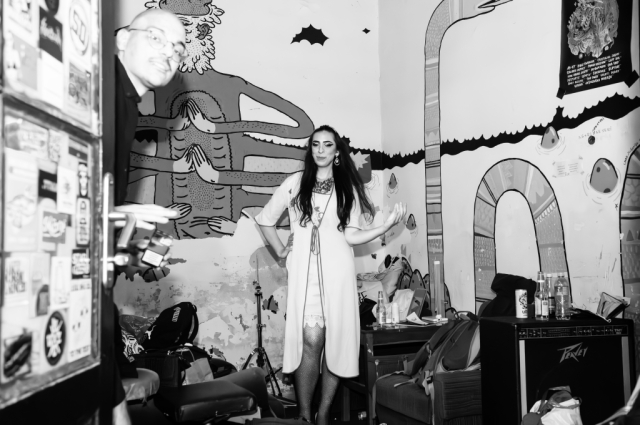 |
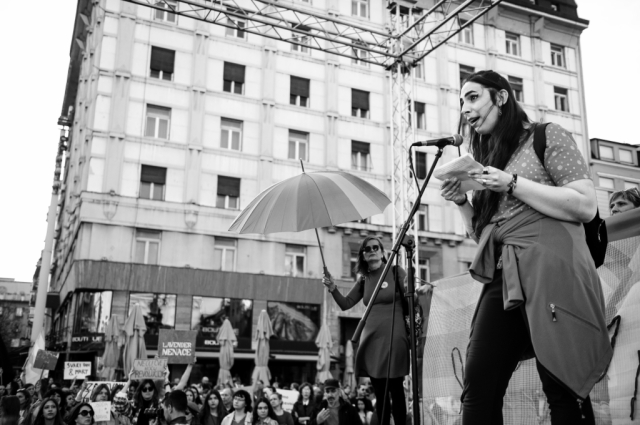 |
||
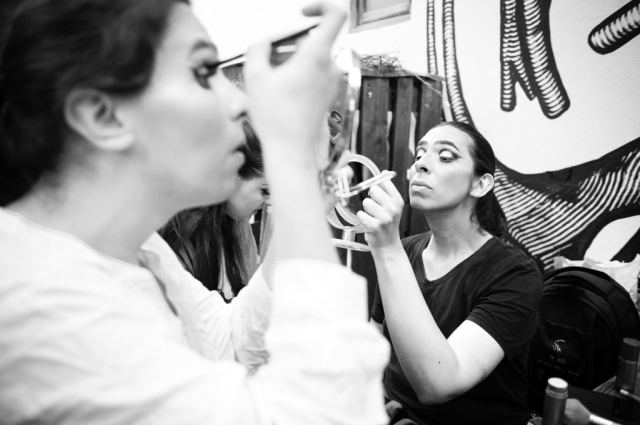 |
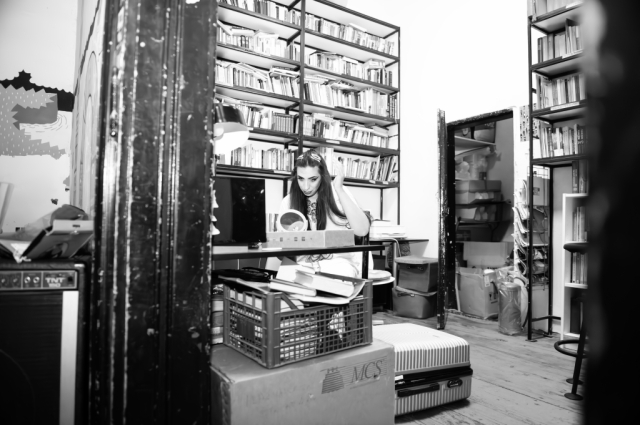 |
||
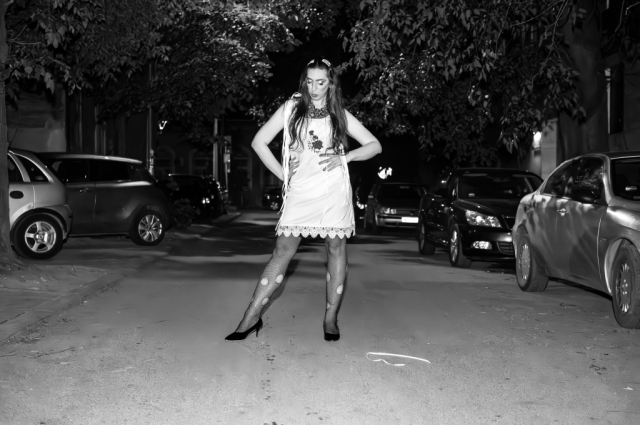 |
Click here to listen to other interviews.




